Famous auteur Guru Dutt’s son Arun Dutt passed away on Saturday after a prolonged period of ill-health.
The soft-spoken filmmaker (he directed the Dharmendra starrer Khule-aam) had done much to keep Guru Dutt’s work alive in the public perception and also ran an acting academy.
Arun Dutt was only eight years old when his father passed away.
We bring you an excerpt from the book Kaagaz Ke Phool: The Original Screenplay written by Dinesh Raheja and Jitendra Kothari.
In this excerpt, Arun Dutt speaks about his relationship with his legendary father Guru Dutt.
I have come to know my father, filmmaker-actor Guru Dutt, and understand him, largely through his films.
I have also gleaned information about him from the letters he penned, and from my conversations with family members and his production staff.
As a child, I did not have much interaction with him; I was only eight years old when my father passed away.
Excerpted from the book Kaagaz Ke Phool: The Original Screenplay. Compilation, Translation, Essays and Interviews: Dinesh Raheja and Jitendra Kothari, Published by Om Books International, An initiative of Vinod Chopra Films Pvt Ltd, with the publisher's permission, Rs 595.
.
'Right till the end of his life, he felt that though he made good films, his work was not acknowledged by sections of the press'
Image: Guru Dutt and Waheeda Rehman on the poster of Kaagaz Ke PhoolI was born in 1956, a year that reflected a very significant shift in my father’s life and work.
It was at this stage that he made the crossover from light commercial musicals, such as Aar Paar and Mr And Mrs 55, to serious films such as Pyaasa and Kaagaz Ke Phool.
According to family elders, there was a sea change in his personality during this time. The cause and effect relationship between his persona and his cinema is interesting -- he started making serious cinema because it mirrored the changes within his thought process; and I also feel that his personality changed in harmony with the type of cinema that he had started making.
I think the changes in his cinema came about because he was disappointed with the kind of reviews his films received.
In fact, right till the end of his life, he felt that though he made good films, his work was not acknowledged by sections of the press.
He craved critical appreciation.
'My childhood interactions with him were probably during the worst phase of his life'
Image: Waheeda Rehman and Guru Dutt in PyasaaWhile my father was always a manic depressive, it started getting worse from 1956 onwards.
Raj Khosla uncle aptly remembered him in his interview with Nasreen Munni Kabir as a person who was not only lost in filmmaking, but was also lost to life.
So, my childhood interactions with him were probably during the worst phase of his life.
Unfortunately, we never enjoyed a one-to-one father-child interface.
He was never a very demonstrative person and was always very quiet and reserved. My elder brother Tarun and I were frightened of his silent and serious demeanour (My younger sister Nina was only two-years-old when he passed away).
We lived in a bungalow at 48, Pali Hill, Mumbai.
My father would wake up late in the morning, by which time we would be in school; when he returned home late at night, we would be asleep. He never believed in designating Sunday as a day-off and we were never encouraged to visit his film’s sets.
Yet we always celebrated our birthdays together.
Tarun and he were both born on the same day, July 9, (1954 and 1925 respectively) and I was born a day later, on July 10, 1956. I treasure a photograph of my first birthday, which captures one big cake, a medium-sized cake and a small cake.
'We did share some memorable moments'
Image: Shyama and Guru Dutt in Aar PaarWe did share some memorable moments. I remember two vacations quite vividly. The first was a family holiday to Kashmir, and the second a hunting trip to Khandwa, in 1963, with Johnny (Walker) uncle and some of my father’s friends.
Though my mother also accompanied us, she spent most of the holiday in the Guest House as Nina was only a few months old.
The trip was organised to see a man-eating tiger that was prowling the jungle and had preyed on many villagers. During the trip our father had taken us for a drive into the thick forest.
To our extreme dismay, the jeep broke down in the middle of the jungle, and Guruswami uncle (his production in-charge and right hand man) fell violently ill. We had to walk back and reached civilisation after a five-hour trek.
On the last day, before we left, the animal was finally spotted and killed. This was a thrilling experience for my brother and me.
In Kashmir, my father hired two houseboats which were latched together with a wooden plank. Once, while Tarun and I were playing, I tripped on the plank and ended up taking a dip in Dal lake.
In another instance, my dad was fishing and asked me to bring some bait from the barge our boat was tied to. While climbing out of the boat, I fell into the lake again. My father had to fish me out.
'Through my father's letters, I learnt that depression was a part of his reality'
Image: Waheeda Rehman, Baby Naaz, Guru Dutt in Kaagaz Ke PhoolThrough my father’s letters, I learnt that depression was a part of his reality. His assessment of life was blended with a dark shadow of pessimism; he dwelt on the negative.
His intrinsic personality is reflected in the despondency that is a part of Kaagaz Ke Phool.
The character he played, Suresh Sinha, is imbued with despair; and this was a reflection of his true self.
Had Suresh Sinha been a practical person, he would not have let his self respect stand in the way of accepting help from his protégée, Shanti. For my father, too, his self-respect was of utmost importance.
From the stories my uncles have told me about their brother, my father emerges as a man who was easily hurt. He portrayed this pain and despondency through the characters in his films.

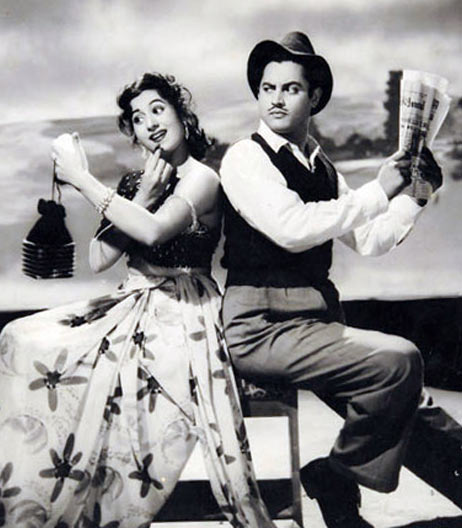
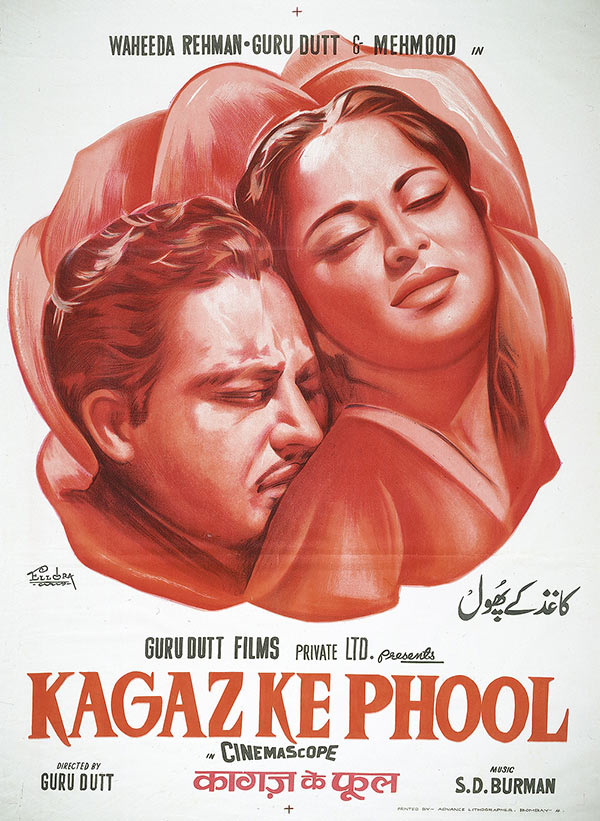
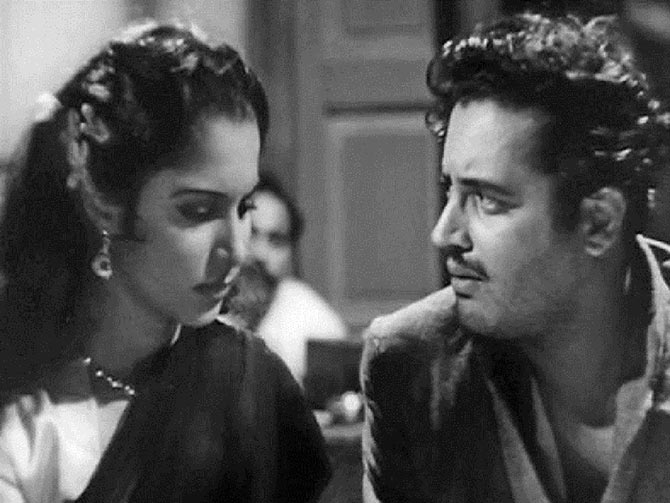
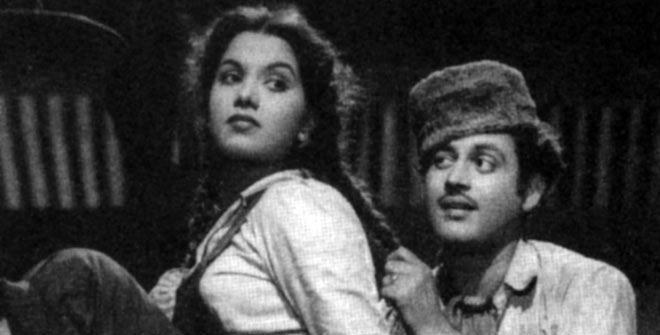
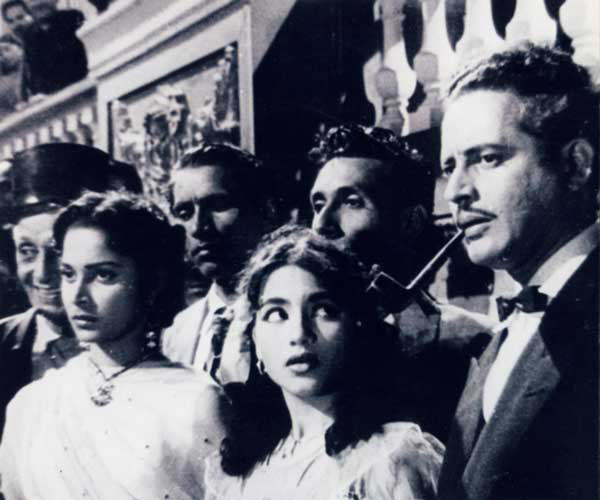
Comment
article